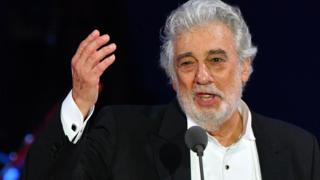This website uses cookies so that we can provide you with the best user experience possible. Cookie information is stored in your browser and performs functions such as recognising you when you return to our website and helping our team to understand which sections of the website you find most interesting and useful.
 Image copyright AFP
Image copyright AFPPlácido Domingo has denied abusing his power while holding management positions at two US opera houses.
The tenor was speaking to the Associated Press as he sought to clear his name following multiple allegations of sexual misconduct, which he denies.
Last year, several women said he pressured them into sexual relationships and had sometimes denied roles to those who rejected him.
"I never promised a part to a singer... or took a part from a singer," he said.
"I have spent my whole life helping, and you know, encouraging and driving people."
He told AP that responsibilities within opera companies are divided, meaning he never had sole sway over casting decisions.
''People that deserved to sing were singing," he said.
However, the 79-year-old refused to answer questions about two investigations by the Los Angeles Opera and the American Guild of Musical Artists (AGMA), the latter of which found Domingo had "engaged in inappropriate activity, ranging from flirtation to sexual advances, in and outside of the workplace".
Domingo's managers and a spokesperson briefly cut off the interview when the star was asked to respond to the findings, the Associated Press said.
His representatives pointed to two written statements by the AGMA, neither of which mentioned abuse of power, to suggest that these specific allegations were baseless.
"Never, never, never," Domingo said, when asked again if he had misused his power as a manager.
'Clear my name'
Even before coronavirus closed opera houses around the world, the allegations had effectively ended the star's career in the US, where he resigned from the Los Angeles Opera - a company he helped found - and forfeited his AGMA membership, saying he realised he would no longer be welcome at New York's Metropolitan Opera and the LA Opera.
Spain's culture ministry also cancelled Domingo's planned performances at the Zarzuela Theatre in May, saying it rejected "all types of harassment, abusive and dominating behaviour".
Earlier this year, the singer apologised to the women who had accused him of harassment.
"I respect that these women finally felt comfortable enough to speak out," he said in a statement issued to the Los Angeles Times.
"I want them to know that I am truly sorry for the hurt that I caused them,"
He added: "I accept full responsibility for my actions, and I have grown from this experience."
However, he appeared to retract the apology earlier this month, after contracting and recovering from the coronavirus.
"I've changed. I am no longer afraid. When I found out I had Covid, I promised myself that if I made it out alive I would fight to clear my name," he said in an interview with the Italian newspaper Repubblica.
"I never abused anyone, I'll repeat that as long as I live," he said.
Most European venues have stood by the star, who has moved into baritone roles in recent years, and he has a full calendar of singing and conducting appearances for the rest of the year.
He also received a lifetime achievement award from the organisers of the Austrian Music Prize in Salzburg earlier this month.
Follow us on Facebook, or on Twitter @BBCNewsEnts. If you have a story suggestion email entertainment.news@bbc.co.uk.



 Africana55 Radio
Africana55 Radio 
